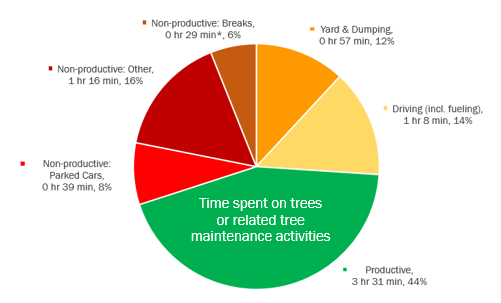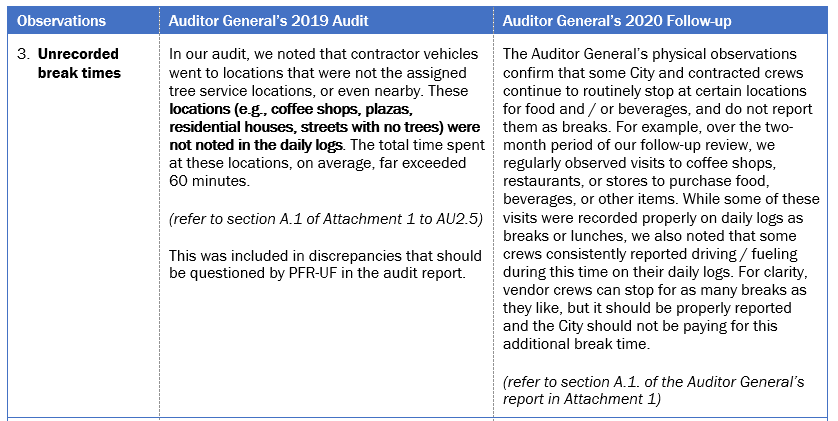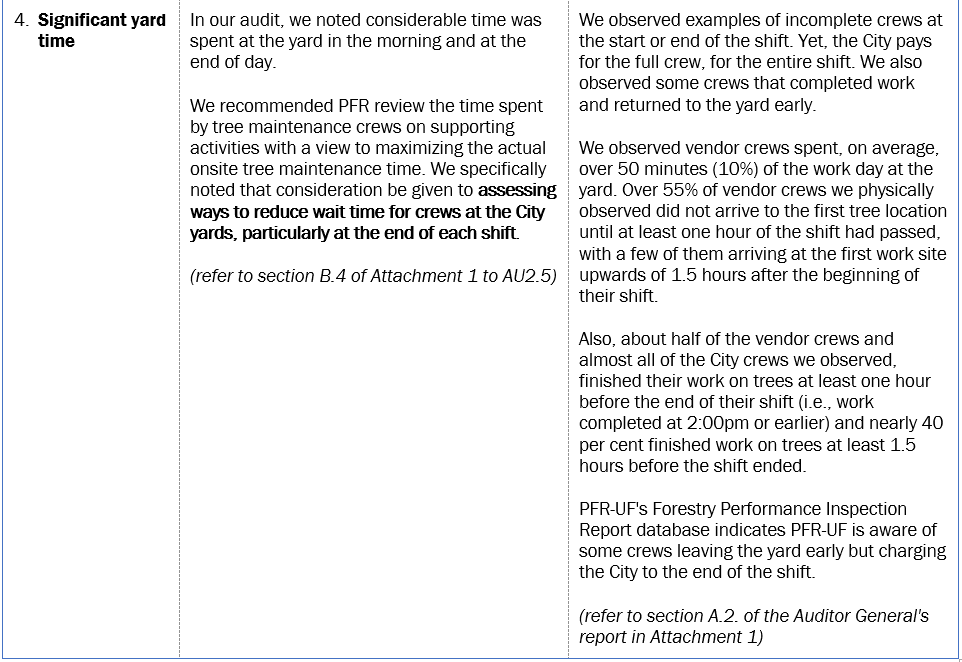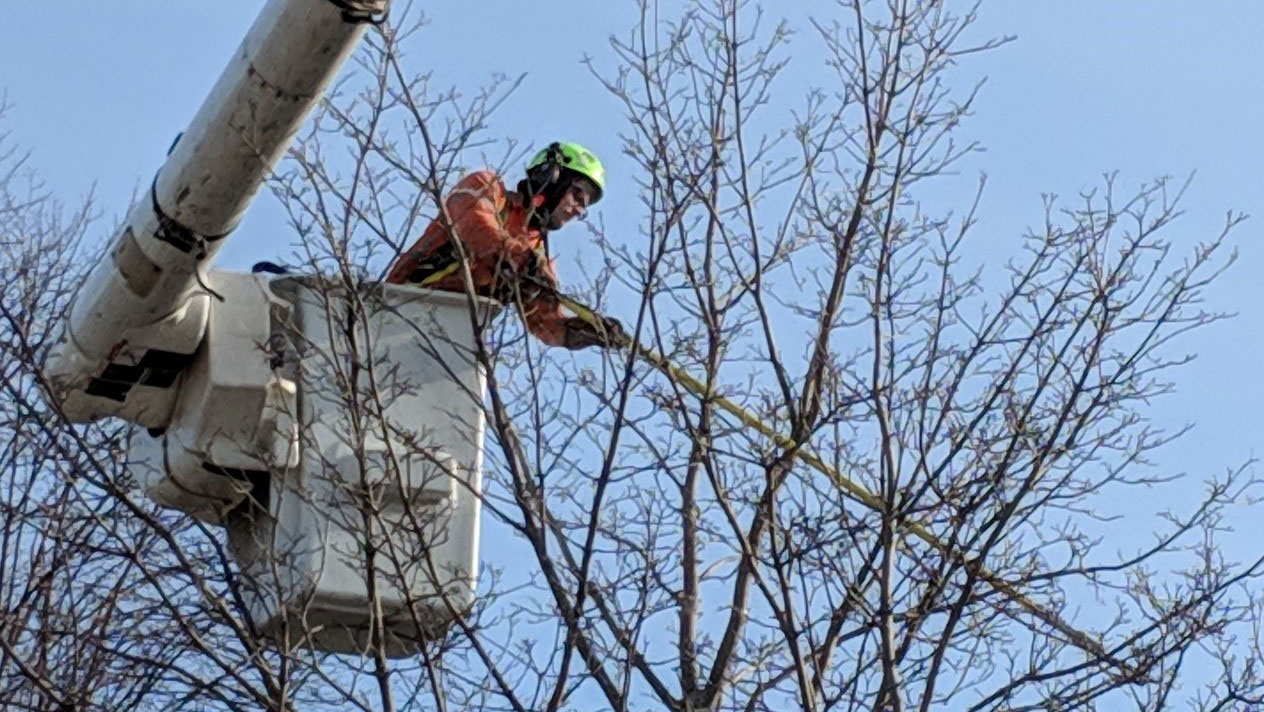Why this Follow-Up Matters
More than 1.5 years since our original audit, concerns persist – the City is still not receiving value-for-money for tree maintenance.
Our follow-up review highlights problems with how Parks, Forestry and Recreation (PFR) is managing and administering these services. This is consistent with our 2019 audit results. PFR needs to put more focus on systematically ensuring outcomes for tree maintenance, whether delivered through contracts or by City staff. Strategic leadership in this area is key to moving PFR towards achieving better outcomes.
Average time spent on trees by vendor crews in a standard 8-hour paid work day, based on Auditor General’s observations during this follow up:

By the Numbers
- In a standard 8-hour paid work day, on average:
- 5 hours working on trees
- 2+ hours non-productive time including down time due to parked cars, extended or unreported breaks, and other idle time
- 2+ hours on supporting activities (e.g., yard, dumping, driving / fueling)
- $1M worth of tree maintenance work gained for every half hour increase, on average, in actual time productively working on trees
- $68K for 478 hours of down time due to parked cars, where contracted crews were not actively working on trees ($408K annualized). This is for contracted crews operating out of just one of the yards, during 2-month follow-up.
- 500+ hours of physical observation of City and contracted tree maintenance crews by AG from July 31 – September 25, 2020
What We Found
GPS accurately shows locations of tree maintenance crews – corroborated by 500+ hours of physical observations. When compared to GPS, we found the accuracy of work locations reported by contracted crews has improved since our 2019 audit – this is good.
A. Increase Operational Efficiency & Productivity
In a standard 8-hour paid working day, City and contracted crews were actively working on trees for less than half the day, on average, and about one hour less than they reported working on trees in their daily logs (excludes time waiting for parked vehicles to be removed).
- 478 hours of down time due to parked cars was reported by contracted crews operating out of one yard during the 2-month follow-up. (Approximately 8% of total reported hours). PFR paid an estimated $68,000 ($408,000 annualized) for this time. There are 8 other yards.
- Breaks / lunch times, together with extended / unreported breaks and other non-productive time, almost always exceeded 60 minutes per day by over 1 hour, on average.
- As recommended in our 2019 audit, minimizing down time and reducing time spent on supporting activities can increase the time City and contracted crews can actively work on trees, improving tree maintenance outcomes.
B. Manage to the Contract
- PFR’s practice is to pay for 30 minutes of break time daily. This costs an estimated $1 million/year. Express terms of the contract do not specify City pays vendors for breaks.
- We observed work practices that raise a safety concern (e.g., not wearing proper safety equipment, potentially not safely operating machinery or equipment).
- For crews we observed with Forestry Performance Inspections, PFR staff often arrived on-site when crews were not actively working on trees, and only remained for a brief time. Many of these on-site and quality control inspections did not effectively identify productivity concerns or inefficient use of time.
C. Leverage GPS for Contract Monitoring
City could not access GPS records for pre-2019 contract years, limiting PFR’s ability to effectively perform retroactive reviews to identify problematic daily logs for 2017 and 2018.
- Two vendors have provided more GPS information since mid-2019.
- One vendor has regularly provided GPS information, but it is of lesser quality than was provided for 2019 audit. ‘Routes travelled’ data is required under contract, but has not been obtained by PFR.
- Standardized City-wide requirements for GPS may enable more consistent oversight, monitoring, and management of contract.
D. Strengthening Contract Management and Contract Monitoring Mechanisms





How Recommendations Will Benefit the City
This report provides a roadmap for improving accountability of management for delivering on tree maintenance service levels and outcomes that ensure optimal value for taxpayer dollars.
